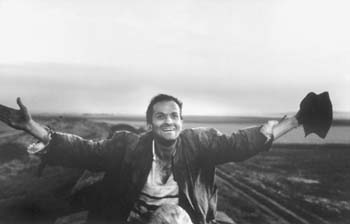![[MetroActive Movies]](/gifs/movies468.gif)
[ Movies Index | Show Times | Santa Cruz | MetroActive Central | Archives ]
Clown Guilt
Radu Mihaileanu's 'Train of Life' tries to laugh in the face of historical horror
By Richard von Busack
WITH TRAIN OF LIFE, the mini-mini-genre of the happy Holocaust movie hits bottom. The breed originated with Jerry Lewis' aborted The Day the Clown Cried, was picked up by Roberto Benigni in Life Is Beautiful and recently resurfaced as Jakob the Liar with Robin Williams. With any luck, Train of Life represents the end of the line. The bigger the clown, the bigger the guilt. What draws prime comedians to this wet material is the chance to make a therapeutic statement about the healing power of laughter--and to justify their humor in a century that's known so much agony. But there's no such clowning to be found here. Director Radu Mihaileanu is a veteran of the Yiddish theater, and the axiomatic broadness of that theater--commemorated in some of the most tormented performances our cinema has recorded--is displayed in this appallingly sentimental film.
In Train of Life, Shlomo the village idiot (Lionel Abelanski) discovers that the SS is about to round up the citizens of his town. After debate, a scheme is unveiled to purchase a train, disguise it as a concentration-camp-bound express and smuggle the population past the noses of the Nazis. The wood salesman Mordechai (played by an actor known only as Rufus) dresses as a German army officer in order to get the train past the checkpoints. Meanwhile, inside the train, the pretty and hot-headed Esther (Agnes de la Fontaine) spurs a discarded suitor into becoming a communist.
Episodic, squabbling comedy prevails as the train heads east. The group invades a Nazi camp, posing as superior officers to requisition food. And if you thought that the behavior of the gypsies in Black Cat, White Cat was stereotypical, wait until you get a load of the belly dancers here. The scenes of the deserted shtetl at dawn are touching, and the local people's incredulity at the Jews' disappearance reminded me of the Ray Bradbury story "Way Up in the Middle of the Air." But the relentless corniness can be suggested by one running joke: the way the numbers on the sides of the boxcars keep swinging back to reveal hidden mezuzahs. The film's "realistic" ending is the last straw. The film is strictly for big-hearted grandmas who cry at the drop of a hat.
[ Santa Cruz | MetroActive Central | Archives ]
Copyright © Metro Publishing Inc. Maintained by Boulevards New Media.
![]()

Train He Rides: Lionel Abelanski hits the rails in 'Train of Life.'
Train of Life (R; 102 min.), directed and written by Radu Mihaileanu, photographed by Yorgos Arvanitis and Laurent Dailland and starring Lionel Abelanski, Rufus and Agathe de la Fontaine, opens Friday at the Nickelodeon in Santa Cruz.
From the November 10-17, 1999 issue of Metro Santa Cruz.